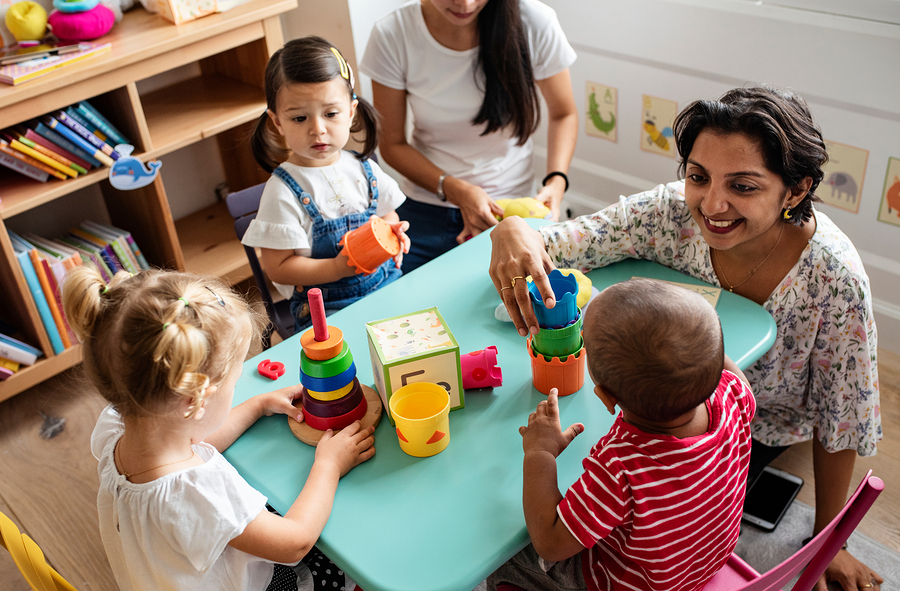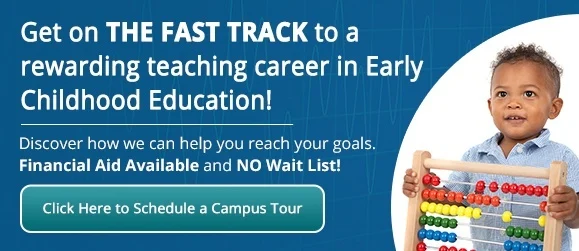Early Childhood Educators Help Build Children’s Social Skills
Posted On February 3,2020

Early childhood education classrooms are busy places where educators are building many different skills in the developmentally crucial years. An important part of this early childhood curriculum is social and emotional skills. Early childhood educators, alongside parents, are key in developing these skills during these early years. Early childhood is when this foundation is established. Children show a natural interest in the world around them and connecting with others, and early childhood educators can capitalize on these interests.
What are Early Social Skills?
Early social skills are behaviors that promote positive interactions among people, as well as how they’re able to resolve simple conflicts. Some important skills for preschoolers and toddlers to have include sharing, taking turns, cooperating, and communicating with each other and with adults. Babies begin these interactions from birth, by crying, facial expressions, and body language. After age one, toddlers begin to crave social interaction with peers as well. As children move through the preschool years, social skills also include empathy, where students learn to care about each other and show interest in others, as well as the ability to recognize, name, and manage their own emotions.
In a classroom, social skills also include behaving in line with classroom rules, following directions, helping out, and cooperating with adults.
Learn More about Our Early Childhood Education ProgramHow do Early Child Educators Teach These Social Skills?
In the early childhood years, play is the main catalyst for learning and expressing social skills. Behaviors such as sharing, taking turns, entering into a group, responding to conflict, and working together all happen organically during play. With the guidance of an early childhood educator, specific opportunities can be engineered to reinforce certain skills. Early childhood educators can foster situations that practice these skills daily. Teachers can be ready to jump in and coach during these teachable moments that arise during the day.
Early childhood educators can also work on these skills directly by using books, puppets, and stuffed animals to work through certain situations. A teacher may be reading a story, and comment, “Oh, I can see that he is sad. Look at how his face changes when his friend won’t play blocks with him.” Using two puppets to work through a sharing situation can teach children what it might look like when they run into a similar situation.
In addition, early childhood educators build social skills by modeling and narrating appropriate behaviors at various points within the school day. They give effective praise when the children use these skills, and they help by providing cues before activities, such as asking one child who he might invite to join him in an activity.
Start Your ECE Process NowWhy is Building Social Skills Important in an Early Childhood Education Setting?
Children who have poor, or more likely, underdeveloped, social skills have a hard time getting along with other children. They also may struggle with positive interactions with adults. When students enter kindergarten with underdeveloped social skills, even if they are academically on point, they can struggle in the school setting. They may develop a negative attitude toward school which can impact their effort and motivation to learn.
Developing social skills in early childhood before students are ready to enter kindergarten enables them to have a healthy school experience, both in adjusting to kindergarten and being able to make and form real friendships. Students with social skills have greater motivation to learn, have a positive attitude toward school, and are more eager to participate in classroom activities.
Play is part of daily life for young children, and with guidance from early childhood educators, play can help these early social skills flourish in the pre-kindergarten years. Are you interested in becoming an early childhood educator? Contact Athena Career Academy today for more information about this exciting career. We have flexible class schedules with no wait list!
